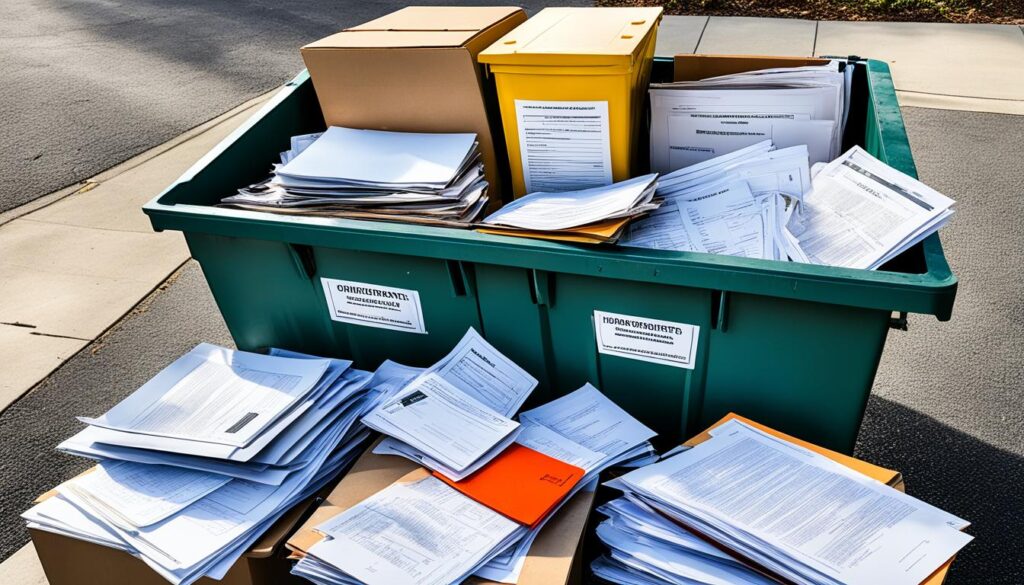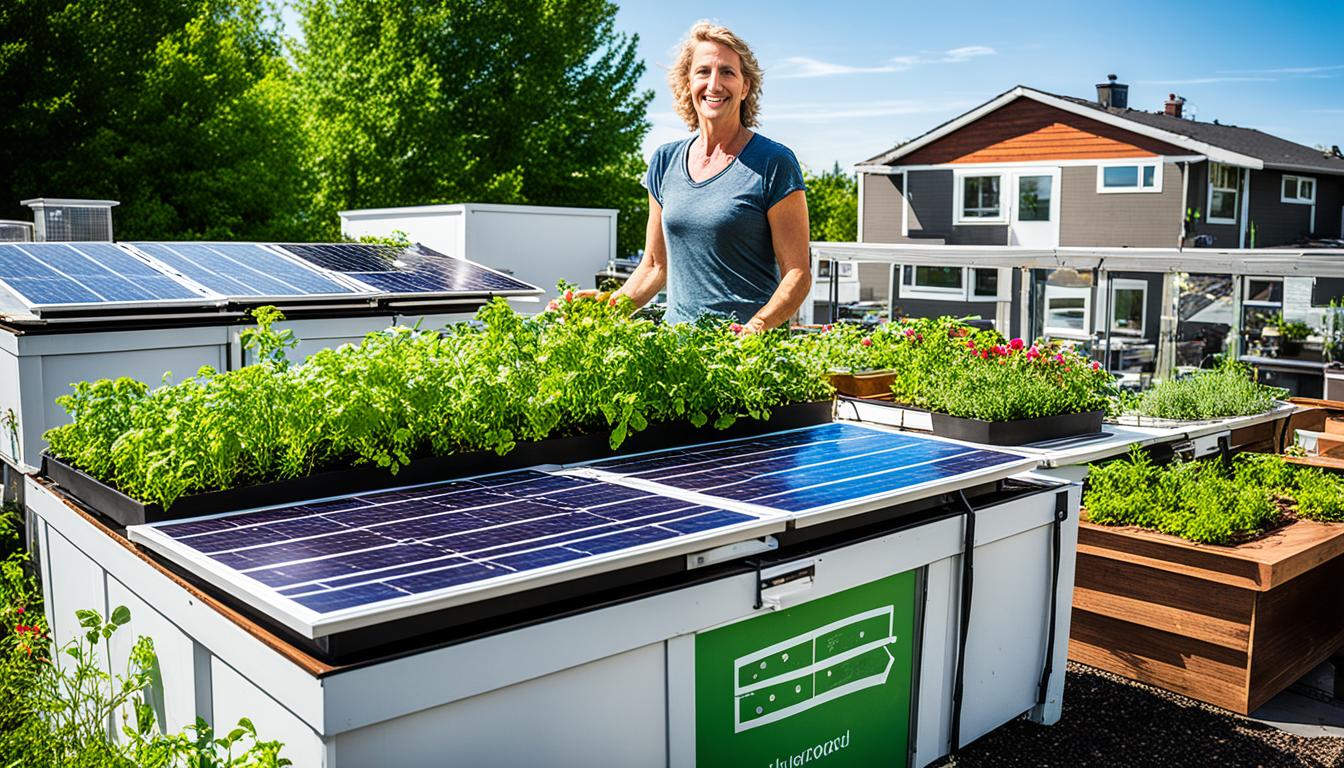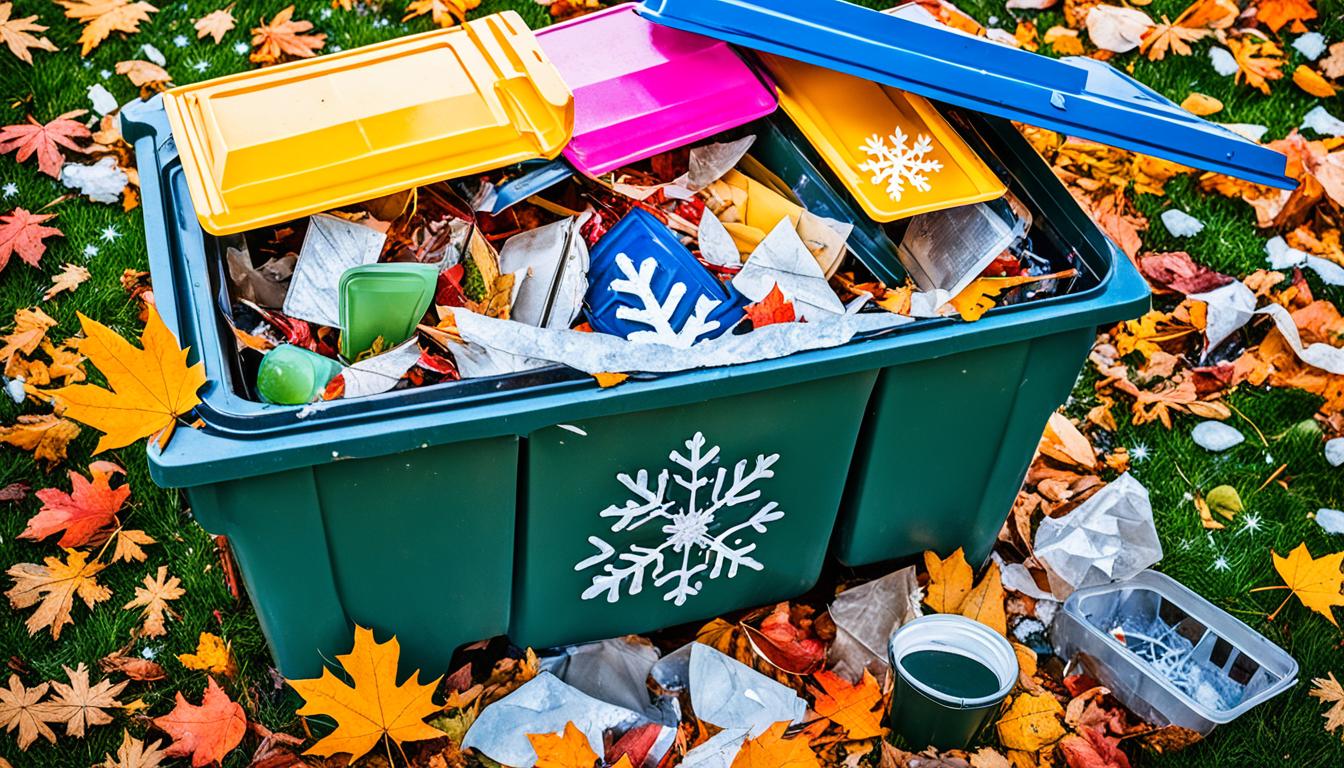Disclosure: This Post Contains Affiliate Links; We earn a commission on purchases.
Do you enjoy finding hidden treasures and unique items while also contributing to a more sustainable lifestyle? Dumpster diving offers a thrilling and eco-friendly way to discover valuable items discarded by others. Whether you’re searching for furniture, electronics, or other exciting finds, developing a dumpster diving routine can provide consistent success in your endeavors.
Creating a daily routine is essential for mastering the art of dumpster diving. By incorporating effective time management, habit-building, and goal-setting techniques, you can optimize your productivity and maximize your chances of finding valuable items. A well-planned routine also allows for personal growth and skill development, fostering a sense of accomplishment and satisfaction.
When developing your dumpster diving routine, consider factors such as determining the best time and location to search, organizing your daily schedule, and planning your route effectively. By following these strategies, you can enhance your chances of discovering hidden gems and reduce the time spent searching.
Key Takeaways:
- Developing a dumpster diving routine requires effective routine planning and time management.
- Setting goals and building habits are key components of a successful routine.
- Organizing your daily schedule and planning your route can optimize your dumpster diving experience.
- Consistency and perseverance are crucial for consistent success in dumpster diving.
- Remember to always be aware of the legal regulations surrounding dumpster diving in your area.
The Potential Benefits of Dumpster Diving
Dumpster diving offers a multitude of benefits that range from cost-effective discoveries to reducing landfill waste. This eco-friendly practice not only provides financial savings but also allows individuals to uncover unique finds that can be repurposed creatively. Engaging in dumpster diving can lead to personal satisfaction and skill development, while also fostering a sense of community connection. Additionally, recycling for money is another avenue for both environmental and financial gains.
Cost-Effective Discoveries
Dumpster diving presents the opportunity to find items of value, such as furniture and electronics, often in surprisingly good condition. By diving into dumpsters, individuals can obtain useful and interesting items without the need to spend a significant amount of money.
Eco-Friendly Practice
By participating in dumpster diving, individuals contribute to reducing waste and minimizing landfill use. This environmentally conscious activity aligns with the ethos of sustainable living. Rather than allowing discarded items to end up in landfills, dumpster divers give these items a second life.
Unique Finds and Creative Repurposing
One of the exciting aspects of dumpster diving is the potential to discover unique and diverse items. These findings can serve as a catalyst for creativity, enabling individuals to repurpose items in innovative ways. By giving discarded objects a new purpose, dumpster divers actively contribute to reducing environmental impact.
“Dumpster diving has not only allowed me to find hidden treasures but also fueled my passion for repurposing. I have transformed discarded furniture into stunning pieces that now serve as focal points in my home.” – Katherine, avid dumpster diver
Personal Satisfaction and Skill Development
Engaging in dumpster diving can lead to personal satisfaction as individuals develop their skills in spotting valuable items and determining their potential for repurposing. This practice encourages individuals to think creatively and enhances their ability to find hidden gems amid the discarded.
Community Connection and Reduce Landfill Waste
Dumpster diving can create a sense of community connection among like-minded individuals who appreciate the value of reducing waste. Sharing knowledge, techniques, and unique finds fosters a supportive network. By actively participating in dumpster diving, individuals help reduce landfill waste and minimize their impact on the environment.
Recycling for Money
Aside from the environmental benefits, dumpster diving can also lead to financial gain through recycling. Items that cannot be repurposed can be sorted for recycling purposes, allowing individuals to contribute to the recycling industry while earning some extra income.

Benefits of Dumpster Diving
| Benefit | Description |
|---|---|
| Cost-Effective Discoveries | Obtain valuable items without spending a lot of money |
| Eco-Friendly Practice | Reduce waste and minimize landfill use |
| Unique Finds and Creative Repurposing | Discover diverse items and repurpose them creatively |
| Personal Satisfaction and Skill Development | Experience satisfaction in finding and repurposing items; enhance skills in spotting valuable finds |
| Community Connection and Reduce Landfill Waste | Foster a sense of community connection among like-minded individuals and contribute to waste reduction |
| Recycling for Money | Contribute to recycling efforts while earning extra income |
Legal Considerations of Dumpster Diving
When engaging in dumpster diving, it is essential to be aware of the legal regulations and consequences associated with this activity. Laws on dumpster diving vary between states in the United States, making it crucial to understand the specific regulations in your area.
In some states, dumpster diving is allowed in public areas but prohibited on private property. However, other states consider dumpster diving a criminal activity altogether. Therefore, it is essential to know the laws in your jurisdiction to avoid any potential legal issues.
Knowing your rights and legal options is crucial when it comes to dumpster diving. If you find yourself in a situation where you are caught or face any legal repercussions, consulting legal counsel can provide valuable guidance and assistance.
Consequences of Dumpster Diving
In the event of getting caught dumpster diving, the consequences can vary depending on the location and circumstances. Potential penalties may include fines or, in more severe cases, even jail time. Being aware of the potential consequences can help you make informed decisions while engaging in this activity.
Understanding the legal regulations and the potential fallout of dumpster diving is essential for anyone considering or currently participating in this practice. By knowing your rights and seeking legal counsel when necessary, you can navigate the legal process effectively and minimize any potential repercussions.
| Legal Considerations | Consequences |
|---|---|
| Varies between states | Potential fines or jail time |
| Public areas vs. private property | Legal penalties based on jurisdiction |

Understanding the legal aspects of dumpster diving is crucial to ensure that you stay within the boundaries of the law. By educating yourself about the specific regulations in your area and seeking legal counsel when necessary, you can enjoy the benefits of dumpster diving while minimizing any potential legal risks.
Personal Insights from an Entrepreneur’s Dumpster Diving Experience
Entrepreneurship is an exciting journey that requires a combination of skills, vision, and resourcefulness. Starting multiple businesses has given me valuable insights into the world of dumpster diving and how it can contribute to entrepreneurial success. Understanding the importance of flow state, identifying adjacent moves, and having a clear vision has been crucial in my entrepreneurial journey.
The Power of Resourcefulness
Resourcefulness is a skill that every entrepreneur should develop. It allows you to find value where others see waste, leveraging available resources to drive success. Dumpster diving provides a unique opportunity to practice and refine this skill, as you uncover hidden gems in discarded items. By tapping into your resourcefulness, you can find creative solutions, repurpose materials, and reduce costs, giving your business a competitive edge.
Unlocking Flow State
Flow state is a mental state of complete immersion and focus, where time seems to fly and productivity soars. Dumpster diving can help entrepreneurs achieve and maintain this state by providing a stimulating and challenging environment. The thrill of the hunt, the need to quickly assess items, and the potential for exciting discoveries can create the ideal conditions for entering a flow state. Embracing flow state mastery can significantly enhance your productivity and decision-making abilities.
Identifying Adjacent Moves
“Adjacent moves” refer to strategic actions or opportunities that are closely related to your current business or industry. Dumpster diving can open doors to unexpected adjacent moves that can fuel your entrepreneurial growth. Through dumpster diving, you may come across materials, equipment, or even potential collaborators that can expand your business horizons. By keeping an open mind and actively seeking out adjacent moves, you can position yourself for long-term success.
Vision: The Missing Piece
While resourcefulness, flow state, and adjacent moves are essential, one skill I wish I had developed earlier is vision. Vision provides the guiding light for your entrepreneurial journey, helping you set long-term goals and make informed strategic decisions. Dumpster diving can sharpen your vision by exposing you to different possibilities, inspiring innovative ideas, and encouraging you to think outside the box. Cultivating a clear vision from the start can save you time, energy, and resources, propelling your business towards success.
Setting Yourself Up for Success
Based on my experience, I would like to offer three essential steps for aspiring entrepreneurs to set themselves up for success:
- Remove Ego from the Equation: Embrace feedback, learn from failures, and be open to different perspectives. Ego management is crucial for personal growth and effective decision-making.
- Manage Energy Effectively: Entrepreneurship requires resilience and perseverance. Take care of your physical and mental well-being, prioritize self-care, and find strategies that replenish your energy.
- Become Adept at Getting into a Flow State: Discover activities or techniques that help you enter a flow state, such as meditation, deep work sessions, or personal rituals. Practice regularly to cultivate greater focus and productivity.
By following these steps and embracing the lessons learned from dumpster diving, aspiring entrepreneurs can build a solid foundation for their entrepreneurial journey.
Motivation and Knowledge in Food Movements: Slow Food, Food Sharing, and Dumpster Diving
In this section, we delve into the motivations behind participating in food movements and the activities and knowledge of active members in Germany. Through interviews conducted with members of the Slow Food organization, Food Sharing organization, and dumpster divers, we gain valuable insights into their experiences.
Exploring Motivations
The motivations for participating in these food movements are diverse, encompassing instrumental, ideological, and identificational factors. Some individuals engage in these movements as a means to address systemic issues in the food industry and promote sustainability. Others find personal fulfillment in actively working towards reducing food waste and fostering a sense of community. The desire to align with like-minded individuals who share similar values is also a significant driving force behind participation.
Activities in Food Movements
Members of these food movements are engaged in a broad range of activities. The Slow Food organization focuses on promoting local and sustainable food production, preserving culinary traditions, and advocating for food biodiversity. They organize events, workshops, and regional initiatives to raise awareness and educate the community about the importance of slow food principles.
The Food Sharing organization is dedicated to reducing food waste by collecting excess food from local businesses and redistributing it to those in need. Their activities include coordinating food pickups, operating community fridges, and organizing educational campaigns on food waste reduction.
Dumpster divers play a crucial role in reducing food waste by rescuing edible but discarded food from dumpsters. Their activities involve sorting, redistributing, and consuming the salvaged food, reducing the amount of perfectly good food that would otherwise go to waste. Dumpster diving not only contributes to minimizing food waste but also challenges existing consumption patterns and advocates for a more sustainable and mindful approach to food.
Knowledge About Food Waste
Each of these food movements holds a distinct focus on food waste reduction, but their knowledge levels may vary. The Slow Food organization emphasizes the importance of sustainable agriculture, ethical sourcing, and preserving traditional culinary practices. Members of this movement possess a deep understanding of the impact of modern food systems on the environment and society.
The Food Sharing organization places significant emphasis on educating the community about food waste. Volunteers and members actively learn about food preservation techniques, safe handling practices, and the environmental consequences of food waste. Their knowledge is essential to ensure the proper handling and redistribution of rescued food.
Dumpster divers possess practical knowledge about food waste and the realities of consumption. They are well-versed in assessing the quality of discarded food, understanding expiration dates, and repurposing ingredients creatively. Their knowledge and skills enable them to make a positive impact by diverting edible food from landfills.
| Food Movement | Main Focus | Activities | Key Knowledge |
|---|---|---|---|
| Slow Food | Promotion of local and sustainable food production | Organizing events, workshops, and regional initiatives | Sustainable agriculture, ethical sourcing, preserving culinary traditions |
| Food Sharing | Food waste reduction through collection and redistribution | Coordinating food pickups, operating community fridges, organizing educational campaigns | Food preservation, safe handling, awareness of environmental consequences |
| Dumpster Diving | Reducing food waste by rescuing discarded food | Sorting, redistributing, consuming salvaged food | Assessing food quality, understanding expiration dates, repurposing ingredients |
While the knowledge domains differ across these food movements, all of them share a common goal of reducing food waste, fostering community, and promoting a more sustainable food system.
Conclusion
Developing a successful dumpster diving routine is all about careful planning and strategic execution. By incorporating effective time management, habit-building, goal-setting, and task management strategies, individuals can establish a consistent and fruitful routine.
One of the main attractions of dumpster diving is the array of potential benefits it offers. From uncovering cost-effective discoveries and participating in eco-friendly practices to experiencing personal satisfaction, this unconventional activity has much to offer.
However, it is crucial to be knowledgeable about the legal regulations that govern dumpster diving. Laws relating to this activity vary between states, so understanding your rights and potential consequences if caught is essential.
In spite of the legal considerations, dumpster diving provides a unique and gratifying experience for those willing to explore it. With a well-planned routine and a comprehensive understanding of the legal landscape, individuals can enjoy the myriad of benefits that dumpster diving brings.
Source Links
- https://dumpsterdiving.info/
- https://addicted2success.com/success-advice/i-built-three-businesses-before-i-graduated-college-heres-what-i-learned/
- https://www.ifama.org/resources/Documents/v18i3/Rombach-Bitsch.pdf

Subscribe to Our Newsletter










